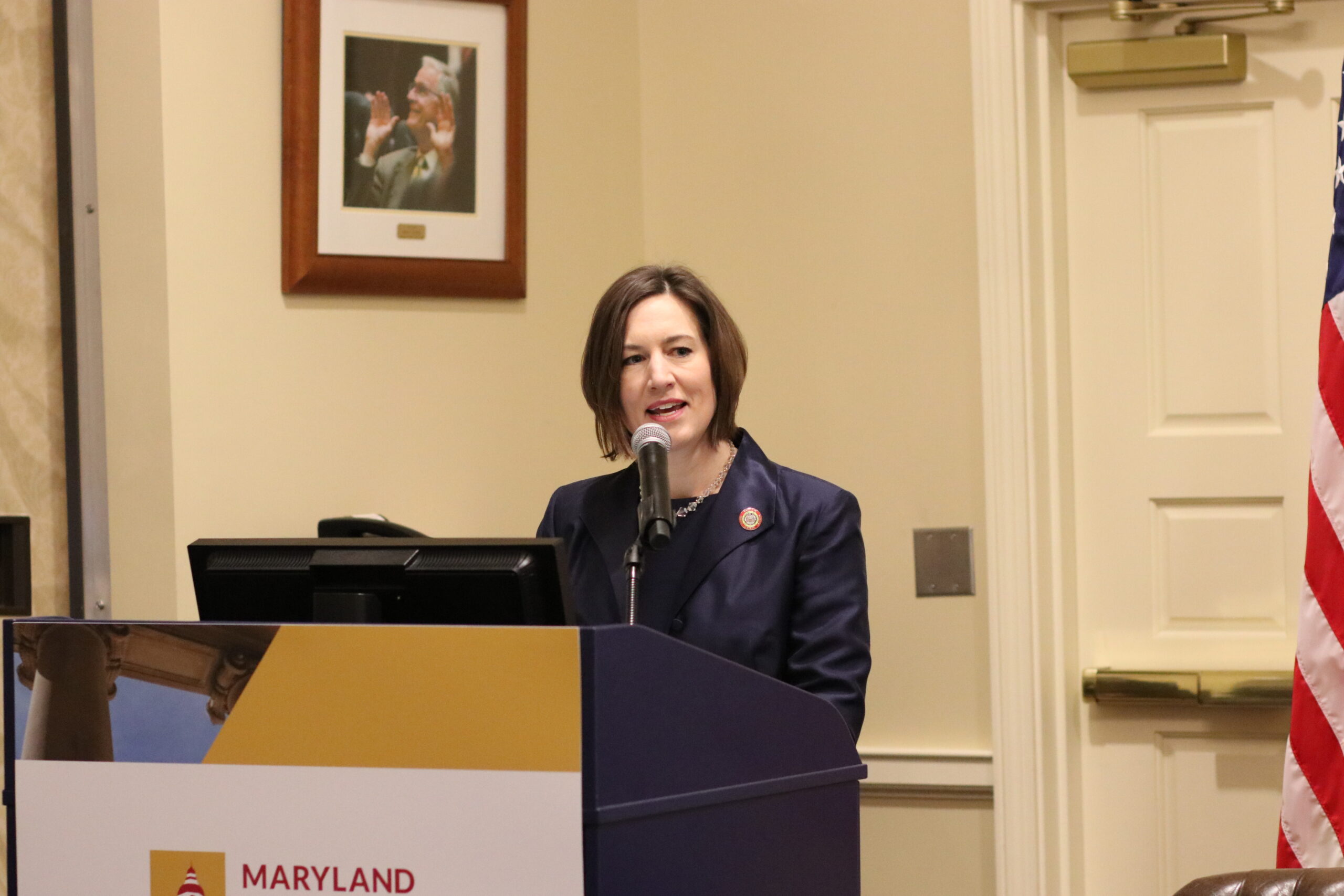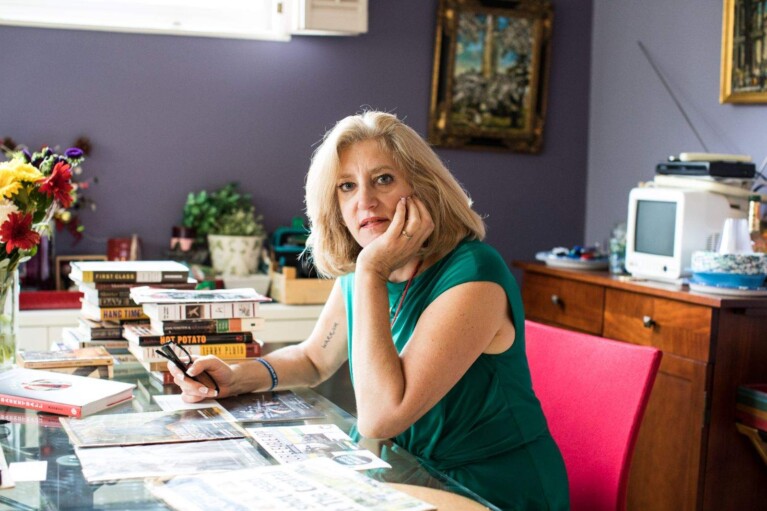
It may be an arranged marriage of convenience, but state Sen. Katie Fry Hester (D-Howard) and some of the Democratic constituents she could wind up representing seemed delighted to meet each other early Monday morning.
Hester was the guest of honor at a virtual breakfast meeting of the Upcounty Democrats of Montgomery County. The senator and the Democratic activists have been brought together by the state’s new legislative district map, crafted by the Democrats in the General Assembly, which divides Hester’s Senate district between Howard and Montgomery counties instead of its current alignment, where it’s split between Howard and Carroll counties.
“We’re all learning new things with all the redistricting configurations and the new maps,” Peter Witzler, a member of the Montgomery County Democratic Central Committee, said during the Zoom session, which attracted about 35 party activists from the Democratic club, whose members live in legislative districts 14, 15 and 39.
If the new legislative district map withstands court challenges, Hester will become part of that family, too.
“I’m really excited to join the Montgomery County delegation,” she said.
Sen. Craig J. Zucker (D), who represents District 14, served as Hester’s warmup act, introducing his colleague and calling her “a star in the Senate.” He also explained that the decision to draw Hester’s 9th District into Damascus and surrounding areas of Montgomery County and take it out of Carroll County was “based on population growth.”
But Republicans — and cynics — see the move as a way to bolster Hester’s reelection bid. She won her seat four years ago by less than 1 point against a Republican incumbent, former Sen. Gail H. Bates, even though it was a Democratic year nationally.
“It’s going to be very challenging this year,” she conceded. “The national environment is not going to be so conducive [to a Democratic victory].”
The portion of Montgomery County that has been added to Hester’s district isn’t anything like the county’s most liberal precincts far to the south. In fact, Damascus and other Upcounty precincts, not too long ago, were strong Republican areas. But with development and population growth, they are decidedly more competitive politically than Carroll County, a conservative bastion.
“It’ll be interesting to learn from and be a part of a county that’s really progressive,” Hester told the Democratic club Monday morning.
The Democrats’ redistricting plan also impacts two of the three delegates in Hester’s Senate district — both of whom are Republican. Dels. Reid J. Novotny and Trent Kittleman have also seen their districts drawn into a portion of Montgomery. Novotny is challenging Hester for the Senate seat this year, and he has decried the new district lines as a blatant Democratic gerrymander.
In an interview Monday, Kittleman said she and Novotny have already spoken to a Montgomery County Republican Central Committee meeting but aren’t sure how much time to spend campaigning in the new territory given the lawsuits seeking to overturn the legislative district lines.
“I did campaign early on but now I have no idea what to do,” she said.
Kittleman said she took some comfort knowing that her late husband, Robert H. Kittleman, a former Republican lawmaker who represented Howard County in the House and Senate, also had a sliver of Montgomery County in his district for much of his tenure.
It’s true that there’s precedent for a Howard-Montgomery legislative district. District 14 was mostly in Howard, but took in a small piece of Montgomery, in the 1980’s, ’90s and early 2000’s, then became a full-fledged Montgomery district in 2002.
Since the redistricting of 2002, Montgomery County has had eight legislative districts wholly within its borders, and Howard County has grown during that time, too. If the General Assembly’s legislative map remains intact, Hester’s 9th District would be the ninth legislative district in Montgomery, even though it would share territory with Howard.
Most of Hester’s appearance before the Montgomery Democratic club was standard getting-to-know-you stuff. She talked about her professional history as an international development officer focused on environmentally sustainable companies. She said she decided to run for office in reaction to President Trump’s election.
“I ran in 2017 because I was really worried about the divisive nature of our politics,” Hester said, noting that she was also concerned about how Trump policies would impact the state. “But knocking on doors, I realized that, regardless of how people are registered, many of us share the same values.”
Hester listed her top priorities for this year’s legislative session: cybersecurity; more aid for Ellicott City, which is in her district, to recover from two devastating floods; health care coverage for small businesses; and setting up a climate resiliency office within state government. She also discussed life as one of a diminishing number of centrists in the General Assembly.
“It’s not always easy being in the middle,” she said. “I feel like the far right and far left aren’t always happy with me.” Yet Hester described herself as a lawmaker who likes to work with colleagues from both parties and all ideological stripes.
“I love what I do,” she said. “I’m really good at my job. And I think the Senate of Maryland needs me.”
Hester was peppered with some questions about local issues from the Montgomery County crew, including how to best utilize land in the county’s vast agricultural reserve, and whether she supports toll lanes to expand Interstate 270. Hester acknowledged that she’ll need to study up on them.
“I’d would really like to listen to you all first,” she said when asked about the proposed I-270 widening. “That’s really my approach.”
But Lorna Forde Phillips, a small business owner and candidate for Montgomery County Council who asked Hester about the highway, offered a glimpse into the complexity of the politics of the debate.
“That’s an interesting question,” Phillips told Hester. “I’d venture to say if you asked that question you’d get several different responses.”
Hester said in a situation like that, “I’d like to find pieces that make both sides happy.”
Asked if she had taken sides in the Democratic primary for governor, Hester said she would remain neutral but planned to enthusiastically support the eventual nominee. She also said she viewed the gubernatorial election as an opportunity to boost voter turnout in down-ballot races.
Zucker, who is chair of the Democratic Caucus in the state Senate, said he and his colleagues will work hard for her reelection.
“When I say that Sen. Hester is a priority for the Democratic Caucus, that’s an understatement,” he said.
Hester offered her own political assessment.
“It’s going to be a difficult race,” she said, “but I just know we can win. I know it.”




 Creative Commons Attribution
Creative Commons Attribution